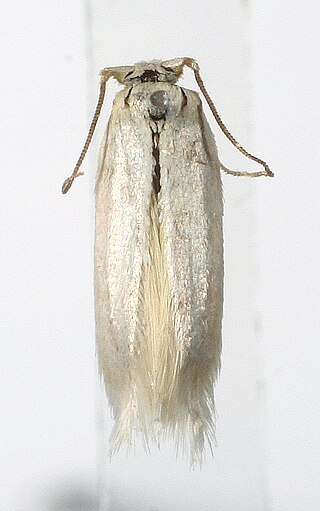
Opostegidae or "white eyecap moths" is a family of insects in the order Lepidoptera that is characterised by particularly large eyecaps over the compound eyes. Opostegidae are most diverse in the New World tropics.
Allodiaptomus is a genus of copepods in the family Diaptomidae, containing the following species:

Eudiaptomus is a genus of freshwater crustaceans in the family Diaptomidae. It contains the following species:
Idiodiaptomus gracilipes is a species of copepod in the family Diaptomidae. It is endemic to "a pool at Itapura", in São Paulo state, Brazil.
Notodiaptomus is a genus of copepods in the family Diaptomidae. It is the most widely distributed, most abundant and most species-rich genus of freshwater calanoid copepods in the Neotropics. The genus was erected in 1936 by Friedrich Kiefer for eleven species formerly placed in a wider Diaptomus. Notodiaptomus deitersi was chosen to be the type species by Raúl Adolfo Ringuelet in 1958.
Odontodiaptomus thomseni is a species of crustacean in the family Diaptomidae. It is found in Uruguay and Venezuela.
Phyllodiaptomus is a genus of crustacean in the family Diaptomidae. It includes the following species:

Thermocyclops is a genus of crustacean in family Cyclopidae. It was first described and later extensively researched by Friedrich Kiefer, who discovered some 20 species. The species and subspecies of the genus inhabit fresh and brackish waters alike all around the world, although most are from tropical areas.
Tropodiaptomus is a genus of copepods in the family Diaptomidae. It includes the following species, many of which are narrow endemics and are included on the IUCN Red List :

Diaptomidae is a family of freshwater pelagic copepods. It includes around 50 genera:
Jacob Walter Ruben was an American screenwriter, film director and producer. He wrote for more than 30 films between 1926 and 1942. He also directed 19 films between 1931 and 1940. His great-grandson is actor Hutch Dano. He was born in New York City and died in Hollywood. He is interred at Glendale's Forest Lawn Memorial Park Cemetery.

Calocalanus is a genus of copepods, the only genus in the family Calocalanidae:

Siphonochelus is a genus of sea snails, marine gastropod mollusks in the family Muricidae, the murex snails or rock snails.
Robertgurneya is a genus of copepods, containing the following species:
Sinodiaptomus is a genus of freshwater copepods in the family Diaptomidae, found in Asia and Palaearctic regions. The Japanese Sinodiaptomus valkanovi has established non-indigenous populations in California, Bulgaria and New Zealand, although only the New Zealand population persists due to destruction of the habitat in California and Bulgaria. The genus was originally described as a subgenus of Diaptomus, containing only Sinodiaptomus chaffanjoni, but now contains five species:

Trionyx is a genus of softshell turtles belonging to the family Trionychidae. In the past many species in the family were classified in this genus, but today T. triunguis, the African or Nile softshell turtle, is the only extant softshell still classified as Trionyx. The other species still assigned to this genus are only known from fossils. T. triunguis is a relatively large, aquatic piscivore.

Temoridae is a family of copepods, containing the following genera:

Lepeophtheirus is a genus of sea louse. The best-known species is L. salmonis, the salmon louse. Other species include L. pectoralis, which uses flatfish as its host, particularly the European flounder, and is also the type species of the genus Lepeophtheirus.
Paranyctimene is a genus of bats in the family Pteropodidae. They are distributed in Indonesia








